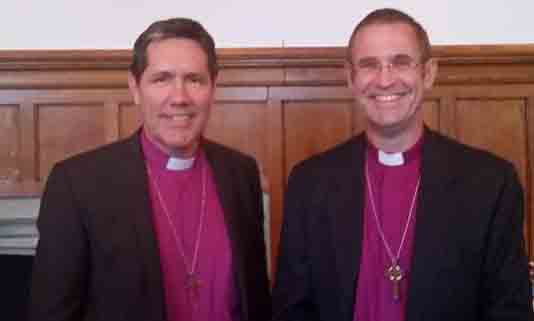Reflections on Canterbury
Reflections
Bishop John Roundhill shares his insights and experiences of the ‘Baby Bishops Conference’, which he recently attended in the United Kingdom, and where “the Communion’s ancient liturgical traditions were fittingly juxtaposed with the high-tech work practices of the Bishops”

The ‘Baby Bishops Conference’ was quite a treat. It is officially called ‘Conference for bishops in the early years of their episcopacy’, but even the Archbishop of Canterbury affectionately refers to it as the ‘Baby Bishops Conference’.
What particularly struck me at the conference is that the Anglican Communion seems to be moving rapidly forwards while simultaneously standing stock still, which is exactly how it should be.
29 bishops from all around the Anglican Communion attended the conference, with The Right Rev’d Dr Murray Harvey, Bishop of Grafton and me representing Australia. This year’s conference attendees came from Australia, Brazil, Canada, India, Japan, Kenya, Madagascar, Melanesia, New Zealand, Pakistan, the Philippines, Scotland, South Sudan, Sri Lanka, Tanzania, the US, and Zimbabwe (see below for a complete list of attendees).
Advertisement
It was quite a gathering, and rather strange for the first few days to experience the peculiar solidarity that mutual jet lag brought, with most of us dealing with our own time zone delay.
The conference was held at Canterbury Cathedral in the UK where we spent 11 days, spanning two Sundays. It was marvelous to be immersed in the daily worship of the community there. Every day we joined the Cathedral for Morning Prayer, Eucharist and Evensong. Evensong was sung with a robed choir and was deeply traditional, as we slowly made our way through about three psalms, taking a breath to allow ourselves to catch up at the ‘diamond’ (the colon in our Prayer Books), as we were taught. The pace of the worship was measured and deeply prayerful and beautiful. The clergy robed in cassocks and surplice for Evening Prayer, and even the vergers (and there seemed to be quite a few) were cassocked. You could easily picture yourself back in time – 50, 100, 200 years ago. However, when you saw the vergers discreetly speak into their lapels, for each had an earpiece and radio, you were abruptly brought back into the modern day.
This blending of the modern with the traditional was also reflected in the activities of the gathered Bishops. We all had mobile phones, and in one meeting we shared photos of our families and homes. There, on a slick modern Samsung phone, the Bishop of Barrackpore (Northern India) shared photos of simple mud-built homes. The same was true of some of the African Bishops. They work and minister in an environment that looks as though it has not changed for centuries, while rocking the newest of phones – just like the clergy at Canterbury Cathedral. This was a glimpse of a well-talked about phenomenon at the conference – the developing world seemingly skipping typical stages of industrial development and moving straight into the digital age. There is something wonderful about seeing so many Bishops engaged on their phones. When I commented that I usually sit at a desk with a PC, there were sympathetic smiles from some who evidently did not envy the backwardness of this Australian Bishop’s work practices.
Advertisement
The Communion’s ancient liturgical traditions were fittingly juxtaposed with the high-tech work practices of the Bishops at the conference. At the rate that the Church is growing in India and Africa, and the opportunities that modern technology is providing, there are exciting times ahead for the Communion. Importantly, the precious practices of the past are not being left behind.
I extend my sincere thanks to the following conference attendees who helped make my visit to the ‘Baby Bishops Conference’ so enjoyable and engaging:
Murray Harvey, Australia.
Marinez Bassoto, Brazil
Nigel Shaw, Canada
Kevin Robertson, Canada
Susan Bell, Canada
Sharad Gaikwad, India
Paritosh Canning, India
George Oommen, India
Naoaki Kobayashi, Japan
Francis Matui, Kenya
John Omuse, Kenya
Joseph Wandera, Kenya
Samitiana Jhonson Razafindralambo, Madagascar
Spencer Hall Speers, Madagascar
Rickson Maomaoru, Melanesia
James Tama, Melanesia
Steven Benford, New Zealand
Leo Paul, New Zealand
Leo Paul, Pakistan
Hilary Pakisan, Philippines
Frenzel Piluden, Philippines
Peter Garang Akeui, South Sudan
Peter Gur, South Sudan
Ian Paton, Scotland
Keethisiri Fernando, Sri Lanka
Jackson Sesthenes Jackson, Tanzania
Darlington Bendankeha, Tanzania
Douglas Sparks, USA
Ignatios Makumbe, Zimbabwe





